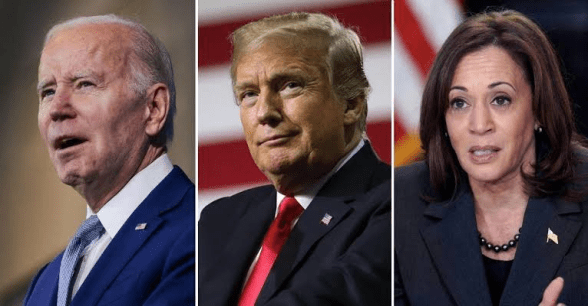
Biden Withdraws from 2024 Race: What It Means for Kamala Harris, the Democratic Party, and Donald Trump’s Campaign Strategy
Fiona Nanna, ForeMedia News
5 minutes read. Updated 6:02PM GMT Sun, 21July, 2024
President Joe Biden has announced his withdrawal from the 2024 presidential race, a decision that has significantly altered the political landscape in the United States. After weeks of adamant declarations that he would remain the Democratic nominee, Biden has succumbed to mounting pressure, making this move just weeks before the Democratic National Convention. This decision raises critical questions about the future of Vice President Kamala Harris, the Democratic Party, and the impact on former President Donald Trump’s campaign strategy.
Kamala Harris: The Potential and Perils
Kamala Harris, who has been Biden’s Vice President for the past four years, now finds herself at the center of the Democratic Party’s nomination process. Biden’s endorsement of Harris as his successor is a powerful signal, given his assertion that choosing her as Vice President was one of his best decisions. In his endorsement, Biden expressed full support for Harris, describing her as a capable leader ready to continue the party’s work.
Harris has responded to Biden’s endorsement with gratitude, emphasizing her commitment to winning the nomination. The Vice President’s candidacy has received a substantial boost from this endorsement, and many Democrats are expected to rally behind her to avoid further uncertainty as the party gears up for the convention.
However, Harris faces significant challenges. Public opinion polls indicate that her approval ratings are comparable to those of Biden, which could pose difficulties in a general election match-up against Trump. Her track record as Vice President has been mixed; she struggled with early criticisms related to her handling of the migration crisis at the US-Mexico border, though she has been more effective in addressing issues related to abortion rights. Furthermore, Harris’s previous bid for the Democratic presidential nomination in 2020 was marked by a series of campaign missteps, which could haunt her as she seeks to secure the nomination.
The Democratic Convention: A Potentially Chaotic Affair
The upcoming Democratic National Convention in Chicago promises to be a dramatic event, in stark contrast to the more scripted Republican convention held last week. With Biden’s withdrawal, the carefully laid plans for the convention have been disrupted. The party’s efforts to unite behind Harris could be complicated by internal disagreements, and the convention might become a platform for intense political maneuvering.
If Harris fails to consolidate support, the convention could devolve into a chaotic contest among various candidates, making for unpredictable and compelling political theater. This unpredictability contrasts sharply with the highly orchestrated nature of recent political conventions.
Republicans: Adapting to a New Challenge
The Republican Party, having focused its recent convention on criticizing Biden’s perceived weaknesses, now faces a revised strategy with Biden out of the race. The GOP had designed its campaign to highlight Biden’s frailty, a strategy that now seems less relevant. With Biden’s exit, the Republican campaign, led by Donald Trump, will need to adjust its approach to address a potentially younger and more dynamic Democratic nominee.
If Harris becomes the Democratic nominee, Republicans are likely to attempt to link her to the current administration’s perceived failures. They may continue to criticize her role as “border czar” and attempt to portray her as a radical leftist, despite her moderate positions. The GOP strategy will also likely include accusations that Democrats have concealed Biden’s age-related weaknesses and jeopardized national security.
As the election season progresses, both parties are navigating an uncertain path. With just a few months until voters head to the polls, the political landscape remains fluid and highly competitive.

